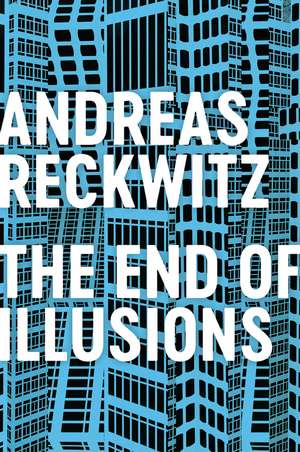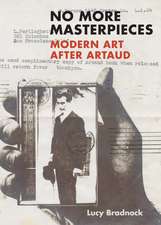The End of Illusions – Politics, Economy, and Culture in Late Modernity
Autor Reckwitzen Limba Engleză Paperback – 24 iun 2021
It is only now that we can see clearly the real scope and structure of the profound shifts that Western societies have undergone over the last 30 years. Classical industrial society has been transformed into a late-modern society that is molded by polarization and paradoxes. The pervasive singularization of the social, the orientation toward the unique and exceptional, generates systematic asymmetries and disparities, and hence progress and unease go hand in hand. Reckwitz examines this dual structure of singularization and polarization as it plays itself out in the different sectors of our societies and, in so doing, he outlines the central structural features of the present: the new class society, the characteristics of a postindustrial economy, the conflict about culture and identity, the exhaustion of the self resulting from the imperative to seek authentic fulfillment, and the political crisis of liberalism.
Building on his path-breaking work The Society of Singularities, this new book will be of great interest to students and scholars in sociology, politics, and the social sciences generally, and to anyone concerned with the great social and political issues of our time.
Preț: 143.42 lei
Nou
Puncte Express: 215
Preț estimativ în valută:
27.45€ • 28.48$ • 22.94£
27.45€ • 28.48$ • 22.94£
Carte disponibilă
Livrare economică 22 februarie-08 martie
Livrare express 11-15 februarie pentru 23.09 lei
Preluare comenzi: 021 569.72.76
Specificații
ISBN-13: 9781509545704
ISBN-10: 1509545700
Pagini: 244
Dimensiuni: 153 x 230 x 16 mm
Greutate: 0.32 kg
Editura: Polity Press
Locul publicării:Chichester, United Kingdom
ISBN-10: 1509545700
Pagini: 244
Dimensiuni: 153 x 230 x 16 mm
Greutate: 0.32 kg
Editura: Polity Press
Locul publicării:Chichester, United Kingdom
Notă biografică
Andreas Reckwitz is Professor of Social Theory and Cultural Sociology at Humboldt University, Berlin.
Cuprins
List of Figures
Introduction: The Disillusioned Present
Progress, Dystopia, Nostalgia
Disillusionment as an Opportunity
From Industrial Modernity to the Society of Singularities
1. Cultural Conflict as a Struggle over Culture:
Hyperculture and Cultural Essentialism
The Culturalization of the Social
Culturalization I: Hyperculture
Culturalization II: Cultural Essentialism
Hyperculture and Cultural Essentialism: Between Coexistence and Conflict
"Doing Universality" - The Culture of the General as an Alternative?
2. From the Leveled Middle-Class Society to the Three-Class Society:
The New Middle Class, the Old Middle Class, and the Precarious Class
The Global and Historical Context
Underlying Conditions: Post-Industrialization, the Expansion of Education, a Shift in Values
In the Paternoster Elevator of the Three-Class Society
The New Middle Class: Successful Self-Actualization and Urban Cosmopolitanism
The Old Middle Class: Sedentariness, Order, and Cultural Defensiveness
The Precarious Class: Muddling Through and Losing Status
The Upper Class: Distance due to Assets
Cross-Sectional Characteristics: Gender, Migration, Regions, Milieus
A Trend toward Political Polarization and Future Social Scenarios
3. Beyond Industrial Society:
Polarized Post-Industrialism and Cognitive-Cultural Capitalism
The Rise and Fall of Industrial Fordism
The Saturation Crisis
The Production Crisis and Polarized Post-Industrialism
Globalization, Neoliberalism, Financialization
Cognitive Capitalism and Immaterial Capital
Cultural Goods and Cultural Capitalism
Winner-Take-All Markets:
The Scalability and Attractiveness of Cognitive and Cultural Goods
Extreme Capitalism: The Economization of the Social
4. The Weariness of Self-Actualization:
The Late-Modern Individual and the Paradoxes of Emotional Culture
From Self-Discipline to Self-Actualization
Successful Self-Actualization: An Ambitious Dual Structure
The Culture of Self-Actualization as a Generator of Negative Emotions
Ways Out of the Spiral of Disappointment?
5. The Crisis of Liberalism and the Search for the New Political Paradigm:
From Apertistic to Regulatory Liberalism
Political Paradigms and Political Paradoxes
Problems and Solutions: Between the Paradigms of Regulation and Dynamization
The Rise of the Social-Corporatist Paradigm
The Crisis of Overregulation
The Rise of the Paradigm of Apertistic Liberalism
The Threefold Crisis of Apertistic Liberalism
Populism as a Symptom
"Regulatory Liberalism" as the Paradigm of the Future?
Challenges Facing Regulatory Liberalism
Bibliography
Notes
Index

















